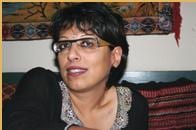Homonationalism in the post-9/11 world continues to perpetuate racism, the Salaam conference, affiliated with the Outgames’ human rights conference, heard in Vancouver on July 28.
It’s here in Canada, it’s in the US, and it’s prevalent in France and in Germany, speakers said.
About four dozen people turned out to hear Vancouver academic and activist Fatima Jaffer, US activist Faisal Alam and Canadian immigration lawyer El-Farouk Khaki discuss human rights, anti-Muslim hysteria, homonationalism and xenophobia.
Simply put, homonationalism refers to queer people and organizations perpetuating ideas of white superiority within the queer community. It’s an issue that marginalizes queers of colour and religions other than Christianity, the speakers say.
Alam says he was labelled unpatriotic within the community when he dared to challenge the war in Afghanistan, despite claims that one of the reasons for the US invasions was the Taliban’s killing of gay people.
A letter to the Boston gay paper Bay Windows even suggested that Alam be stripped of his passport and sent to the US prison in Guantanamo Bay, Cuba, Alam alleges.
“After 9/11 is the first time we saw a backlash against queer Muslims from within the queer community,” he says. “That was something we were not expecting at all.”
Homosexuality and Islam are often set up in communities and by the media as “opposing forces,” says Jaffer.
It’s often portrayed as the split between civilization and barbarism, she says.
It’s part of a larger picture where outsiders such as First Nations, immigrants and refugees are seen as apart from the Canadian master narrative — while making unreasonable demands on the nation, Jaffer continues.
“The failings of outsiders are seen as inadequacies of their entire race,” she adds, while “no matter how homophobic or racist white Canadians are, it’s never seen as reflective of their entire race.”
That’s why organizations such as Trikone, a group for queer South Asians, are so important, Jaffer says.
She says Trikone has two primary mandates: to tackle homophobia in ethnic and religious communities, while simultaneously attempting to counter racism in the queer community.
In doing this work, Jaffer says she’s been accused of diminishing homophobia by bringing up racism in the queer community. “We’ve been fighting homonationalists all along the way,” she says. “I was being seen as not being queer and patriotic, not being Canadian in the way that it’s being framed by the queer community.”
She says there should not be a separation in being queer and Muslim.
Alam says tensions could be further heightened by the Christian right’s recent attempts to leverage Muslim groups in its fight against gay rights, such as in the Proposition 8 battle, which rolled back gay marriage in California in 2008.
That leveraging has also been seen in British Columbia, where Christian and Muslim groups joined forces in a parents’ group that unsuccessfully fought the June passage of Burnaby’s gay-friendly school policy, Alam notes.

 Why you can trust Xtra
Why you can trust Xtra


